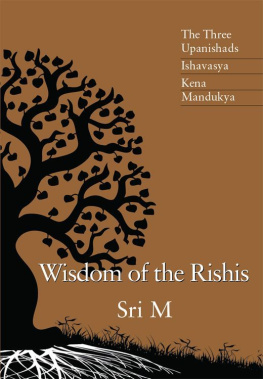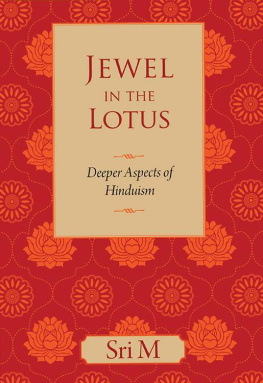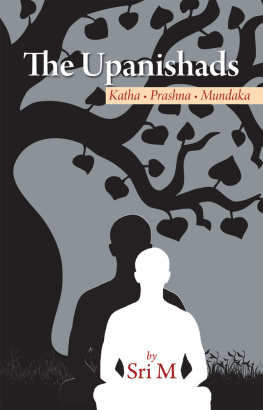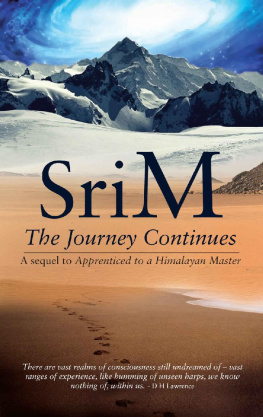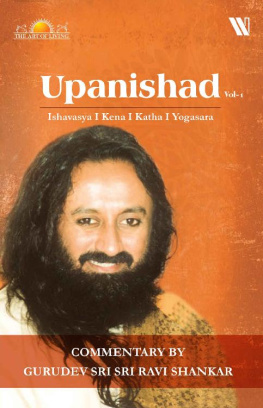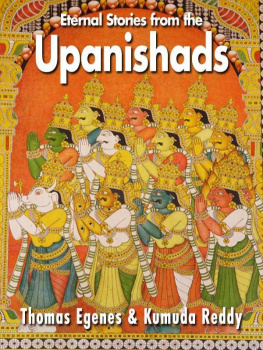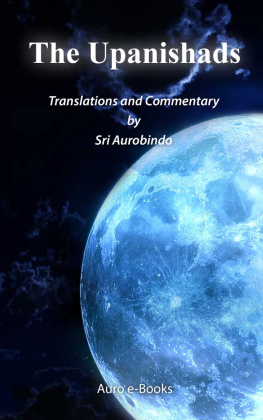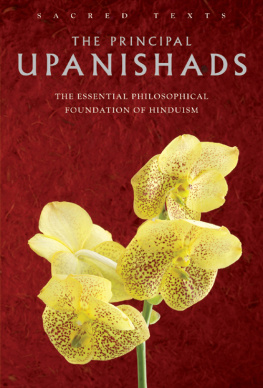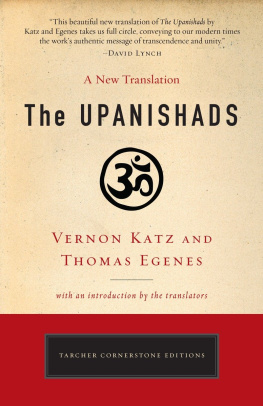Sri M - Wisdom of the Rishis: The Three Upanishads: Ishavasya, Kena & Mandukya
Here you can read online Sri M - Wisdom of the Rishis: The Three Upanishads: Ishavasya, Kena & Mandukya full text of the book (entire story) in english for free. Download pdf and epub, get meaning, cover and reviews about this ebook. year: 2012, publisher: Magenta Press, genre: Religion. Description of the work, (preface) as well as reviews are available. Best literature library LitArk.com created for fans of good reading and offers a wide selection of genres:
Romance novel
Science fiction
Adventure
Detective
Science
History
Home and family
Prose
Art
Politics
Computer
Non-fiction
Religion
Business
Children
Humor
Choose a favorite category and find really read worthwhile books. Enjoy immersion in the world of imagination, feel the emotions of the characters or learn something new for yourself, make an fascinating discovery.
Wisdom of the Rishis: The Three Upanishads: Ishavasya, Kena & Mandukya: summary, description and annotation
We offer to read an annotation, description, summary or preface (depends on what the author of the book "Wisdom of the Rishis: The Three Upanishads: Ishavasya, Kena & Mandukya" wrote himself). If you haven't found the necessary information about the book — write in the comments, we will try to find it.
Sri M: author's other books
Who wrote Wisdom of the Rishis: The Three Upanishads: Ishavasya, Kena & Mandukya? Find out the surname, the name of the author of the book and a list of all author's works by series.
Wisdom of the Rishis: The Three Upanishads: Ishavasya, Kena & Mandukya — read online for free the complete book (whole text) full work
Below is the text of the book, divided by pages. System saving the place of the last page read, allows you to conveniently read the book "Wisdom of the Rishis: The Three Upanishads: Ishavasya, Kena & Mandukya" online for free, without having to search again every time where you left off. Put a bookmark, and you can go to the page where you finished reading at any time.
Font size:
Interval:
Bookmark:
Forthcoming Titles from Magenta Press
How to Levitate and Other Secrets of Magic by James Talbot
Wisdom of the Great Sages: Conversations with Sri Guru, Babaji and Other Masters by Sri M
Other Books by Sri M
Jewel in the Lotus: Deeper Aspects of Hinduism, published by Magenta Press
The Little Guide to Greater Glory and a Happier Life,published by Hima Communication
Apprenticed to a Himalayan Master: A Yogis Autobiography,published by Magenta Press
For more details log on to www.magentapress.in

The author, 1997.
First printed 2002.
This edition, 2012.
All rights reserved. No part of this publication may be reproduced, stored in retrieval system or transmitted by any means, electronic, photocopying, recording, or otherwise, without the prior written permission of the copyright holders.
eISBN: 978-81-910096-3-7
Book design: J. Menon. www.grantha.com
Typeset at PACE systems & graphic communications, Chennai.
Printed at Print Plus, Mumbai
Published by Magenta Press and Publication Pvt Ltd., Cauvery Towers, College Road-Madikeri, Kodagu, Karnataka 571 201. Tel: +91 9845831683.
www.magentapress.in
Contents
Preface

The contents of this book are the edited transcriptions of the discourses on the Upanishads by Sri M.
Minimum editing has been done to retain the style of the talks. The editor acknowledges the contribution of Ms. Uma Singh and Ms. Kamal Aswani in transcribing the discourses with care and attention.
The introductory portions might sound repetitious at times, but that could not be avoided, considering that the talks were given at different times to different people. It is suggested that these portions be re-read for a thorough comprehension of each Upanishad.
Editor
Foreword

The Upanishads represent the high watermark not only of Hindu Philosophy but of spiritual literature anywhere in the world. These marvellous discourses and dialogues between self-realized seers, known as Rishis, and one or more disciples, contain powerful and eloquent statements regarding the ultimate reality in its multifarious facets. They have been well described as providing an ecstatic slide show of reality, a privileged glimpse of the unitive vision in which all thing are one in a world aflame with God. They contain some of the most eloquent passages such as I have seen that Great Being shining like a thousand suns beyond the darkness; it is only by knowing that being that we can achieve immortality and again, Hear O children of immortal bliss, you are born to be united with the Divine; follow the path of the illumined ones and be united with the Supreme Being.
The universal truths articulated in the Upanishads have formed the basis for numerous commentaries down through the centuries, beginning with the luminous insights of Adi Shankaracharya. In our own times Sri Aurobindo, Sri Krishnaprem, Dr Radhakrishnan, Swami Ranganathananda, Eknath Ishwaran and other great seers and sages have produced commentaries and interpretations on various Upanishads. The Upanishads are enduring and unfailing sources of inspiration, and their impact grows with each successive reading. One of my favourites is the Mundaka which I have translated and upon which I have attempted a short commentary.
The author of this book, Sri Mumtaz Ali, popularly known as M, has spoken extensively upon the Upanishads, based on his personal experience. The fact that a person born a Muslim should have such a deep insight into the Hindu tradition proves once again that the spiritual path accepts no boundaries. The three Upanishads upon which M has commented are among the most important the Ishavasya, which is always given pride of place in any list of Upanishads, the Mandukya which expounds the deeper symbolism of the sacred symbol Aum, and the Kena where we have the marvellous allegory of the Devas who thought they had won a victory, whereas actually it was the victory of the divine Brahman. In this Upanishad we come across Shiva and Yaksha, whose identity the Devas are unable to comprehend, and are also introduced to Uma, Haimavati, the many splendoured daughter of the Himalayas, who appears as the mediator between the Devas and the Supreme Brahman.
In these talks M has expounded in a clear and cogent fashion various aspects of these three great texts. I have pleasure in commending this book to spiritual seekers and students of Hinduism around the world.
Dr. Karan Singh
A Profile of M

The boy was a little more than 9 years old when he saw the strange being. He was the son of a Deccani Muslim family, settled in Trivandrum, the beautiful capital of Kerala. Having heard stories of angels coming down to bless Mohammed and other prophets and saints from his devout grandmother, he thought at first that it was an angel.
One evening, the boy was wandering around the courtyard of his house in Vanchiyoor, doing nothing in particular. At the far end of the courtyard, he saw someone standing under the jackfruit tree. The stranger gestured to the boy to come forward. The boy felt no fear whatsoever, and was eager to go closer to the stranger.
The stranger was tall, fair and well-built and was bare-bodied except for a piece of loin cloth worn around his waist. He put his right hand on the boys head and asked with kindness, Do you remember anything? in Hindi. To the boys answer that he didnt, the stranger said in Deccani, You will understand later. You will not meet me for many years after this, but you will have to finish the studies that you have left incomplete. You will not be allowed to tell anyone about me until the time is ripe. Go home now. With that he vanished.
That was the first initiation. Two years later, while playing hide and seek, the boy experienced what may be described in yogic terms as Keval Kumbhak the suspension of inhalation and exhalation. Bliss filled his heart. The breathing resumed in a few minutes.
Soon he could get into it at will with a deep sigh. The bliss that he experienced convinced him that a greater world existed within his being a world of spiritual bliss.
In his outward appearance he was just like any other boy except that he loved religious scriptures and philosophy no matter of which religion, devotional songs and discussions on God, saints and sages.
When he was eleven, he used to go in the evenings to a certain house which belonged to one Mr. Pillai, whose nephew and son-in-law tutored him in mathematics. One evening he entered Pillais house as usual and found himself face to face with a venerable, sturdy man of about sixty, clean shaven and with closely cropped silver grey hair, wearing a half sleeved shirt and loin cloth, sitting cross-legged on a bench. The room smelled of incense.
Hello! said the old man in Malayalam, Come, come. Dont be afraid.
M walked up to him. The man patted his back and caressed his neck and head and said, Umm. Good! Everything will be all right in good time.
Again the breathless condition and greater bliss. M stood up and went straight home. The guidance had begun. He was the first of the great souls M was to meet in the course of his spiritual journey.
Next pageFont size:
Interval:
Bookmark:
Similar books «Wisdom of the Rishis: The Three Upanishads: Ishavasya, Kena & Mandukya»
Look at similar books to Wisdom of the Rishis: The Three Upanishads: Ishavasya, Kena & Mandukya. We have selected literature similar in name and meaning in the hope of providing readers with more options to find new, interesting, not yet read works.
Discussion, reviews of the book Wisdom of the Rishis: The Three Upanishads: Ishavasya, Kena & Mandukya and just readers' own opinions. Leave your comments, write what you think about the work, its meaning or the main characters. Specify what exactly you liked and what you didn't like, and why you think so.

